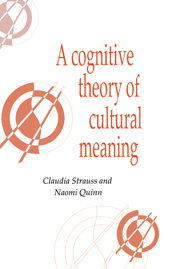Part III - Practice and possibilities
Published online by Cambridge University Press: 05 June 2012
Summary
Paula's life supplies convenient illustrations of our points, but empirically minded readers may be impatient with fiction and eager for us to tie our approach to real applications. While we could not possibly give full accounts of our own research within the confines of this book, much of that work is published elsewhere and will either be excerpted or cited as appropriate in what follows. Naomi Quinn's current research revolves around US Americans' shared understandings of marriage, while that of Claudia Strauss centers on the beliefs of diverse US Americans about welfare and success. Both bodies of research lean heavily on the close analysis of discourse from interviews, though the interviews themselves and the methods by which the resulting discourse was analyzed were designed for somewhat different ends. By and large, Naomi Quinn's research is designed to uncover centripetal properties of culture, particularly the sharedness and motivating force of understandings; Claudia Strauss' research is designed to reveal centrifugal properties of culture, particularly, different ways people can internalize the cultural understandings they learn, and the effect of these differences for cognitive consistency, motivation, and conformity to or divergence from dominant ideologies.
- Type
- Chapter
- Information
- A Cognitive Theory of Cultural Meaning , pp. 135 - 136Publisher: Cambridge University PressPrint publication year: 1998



